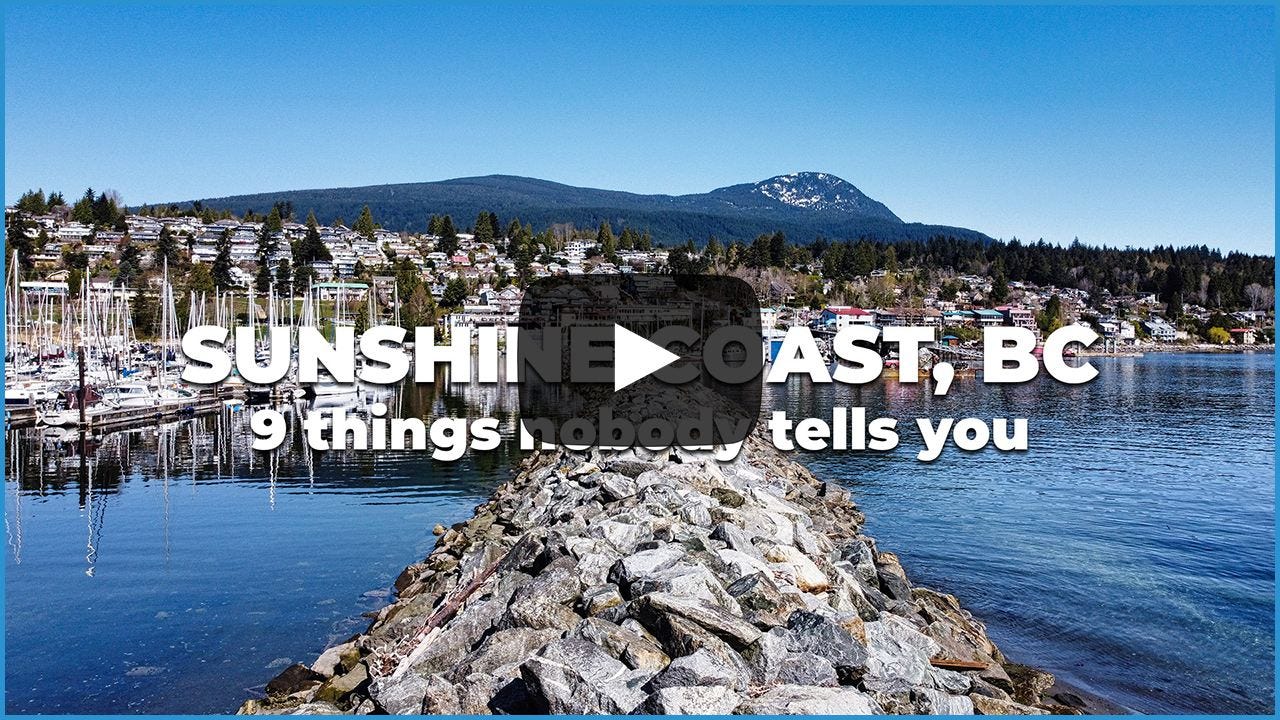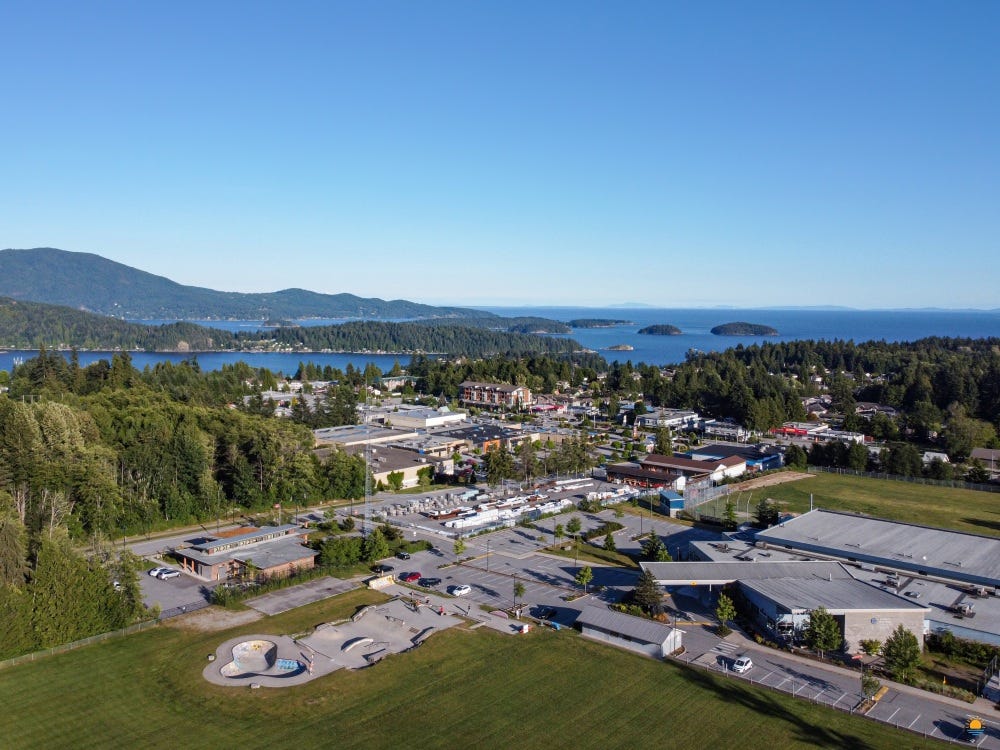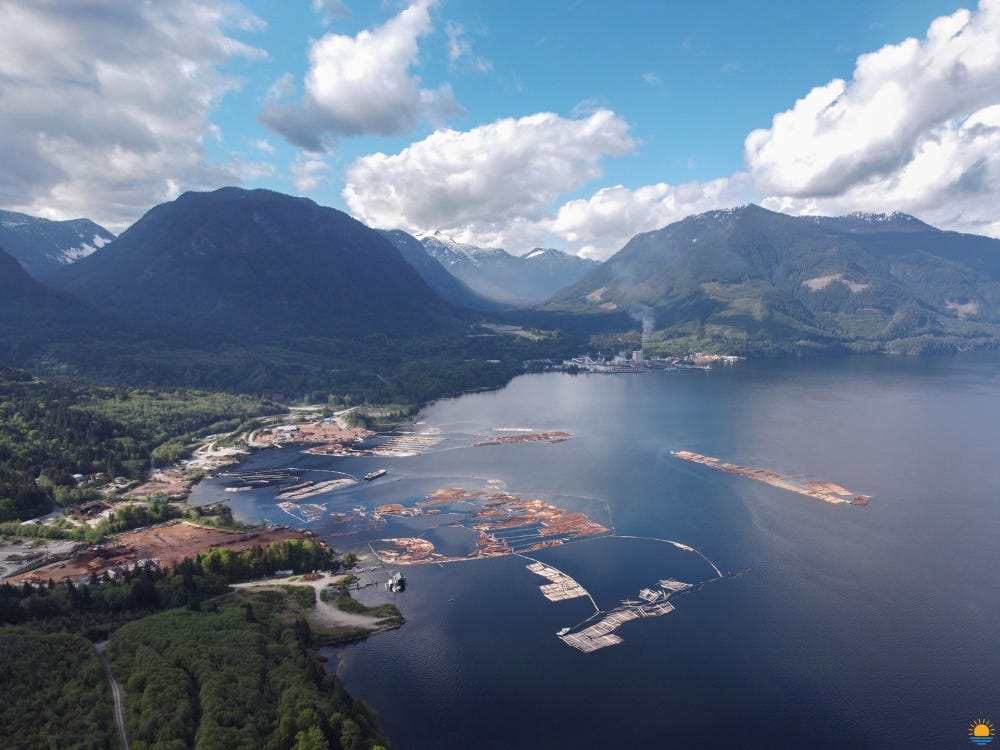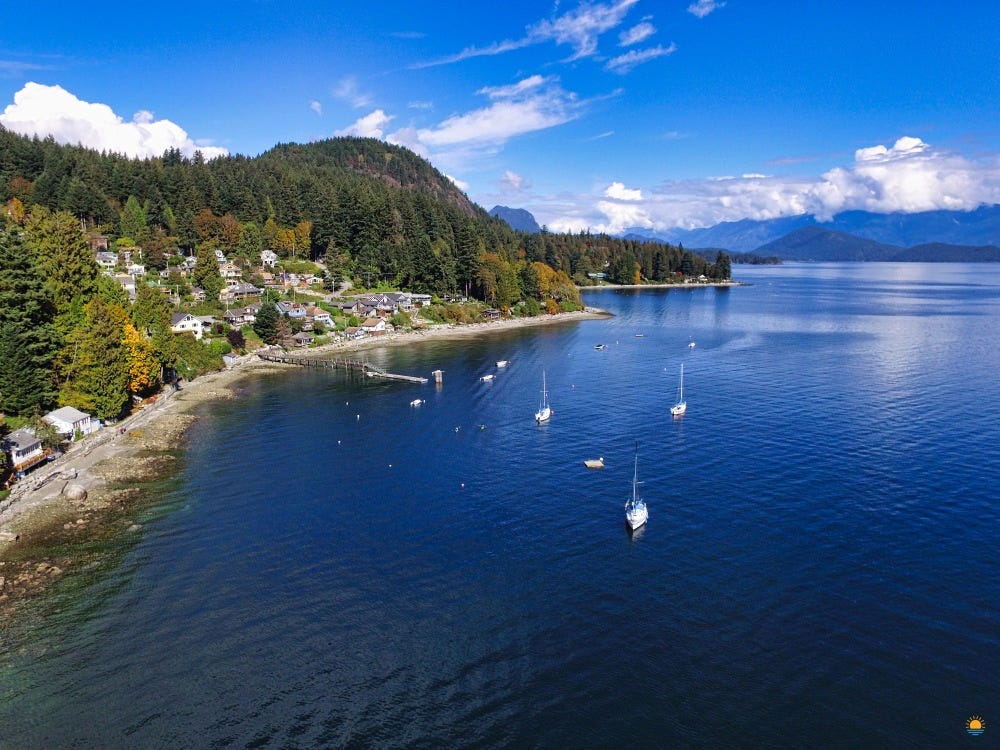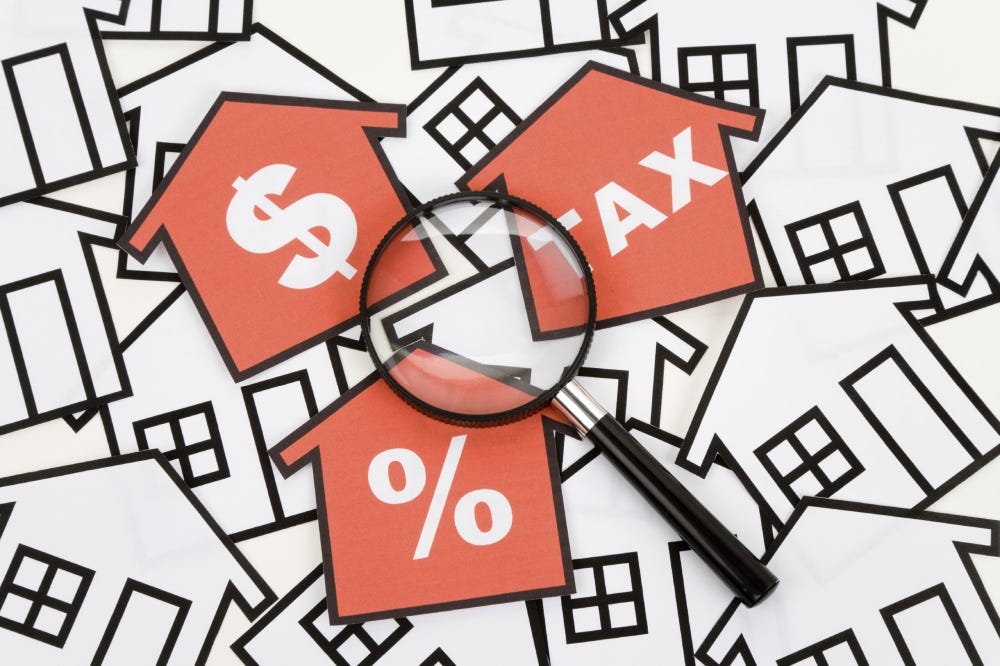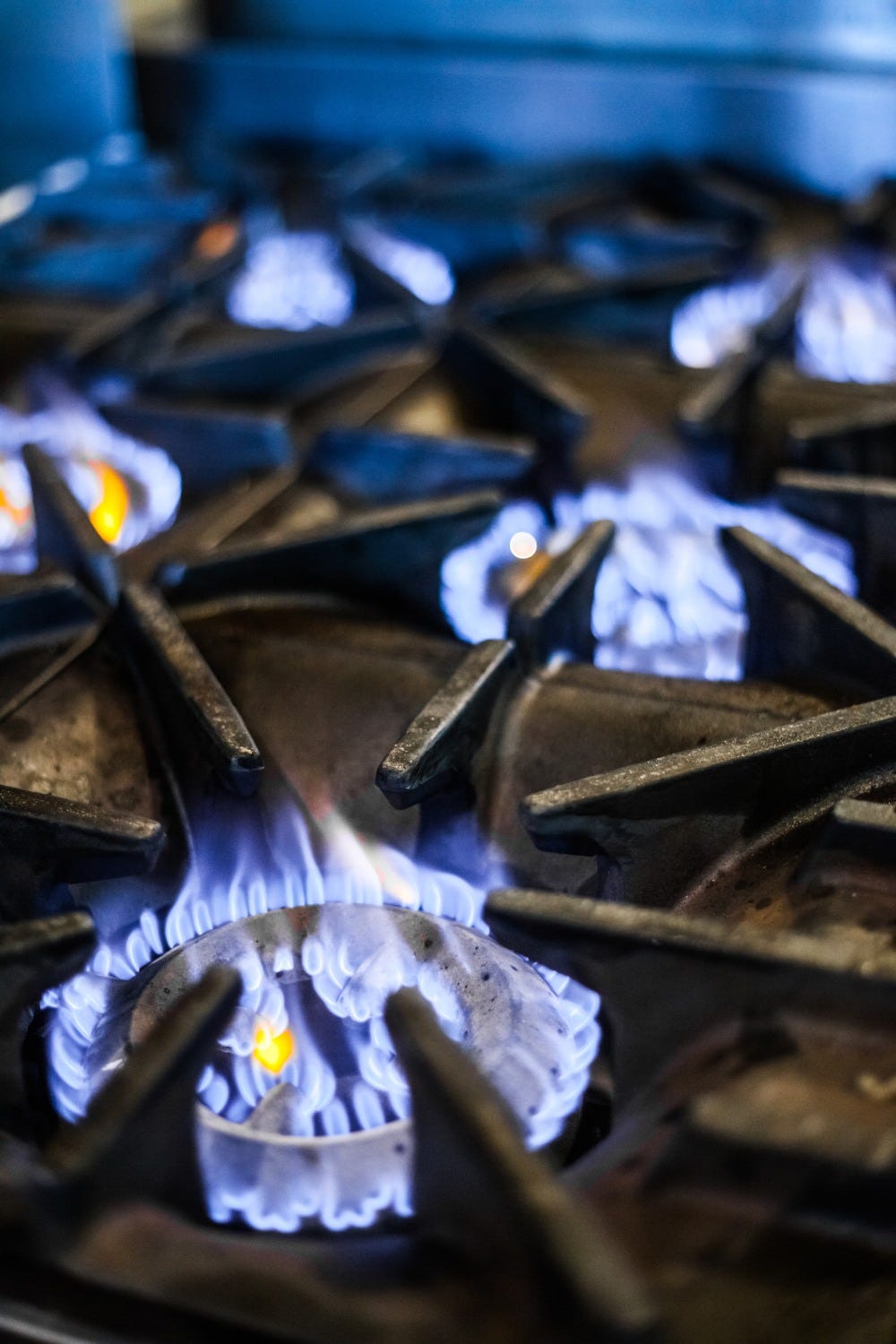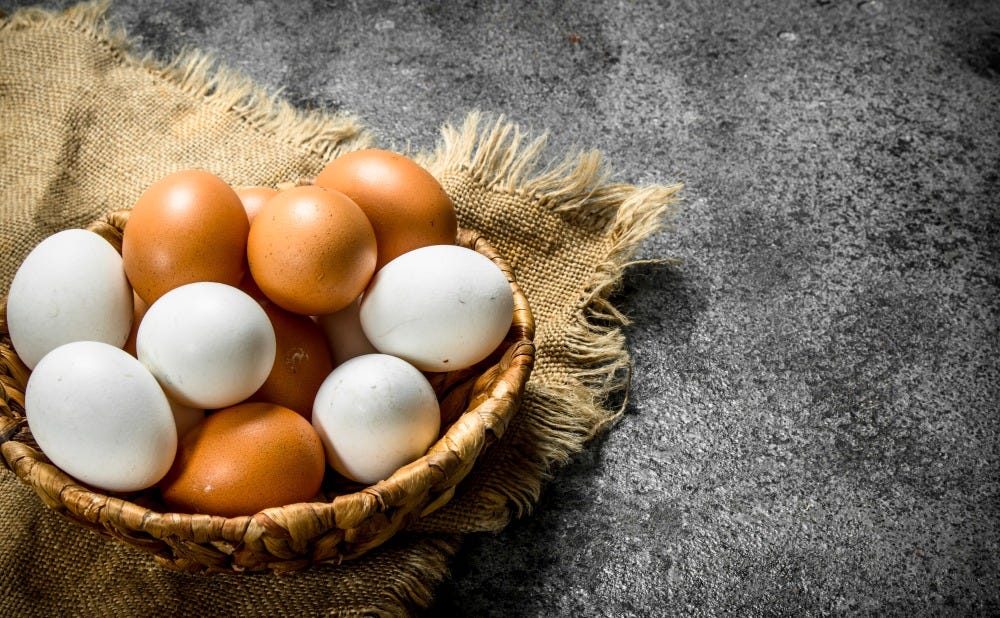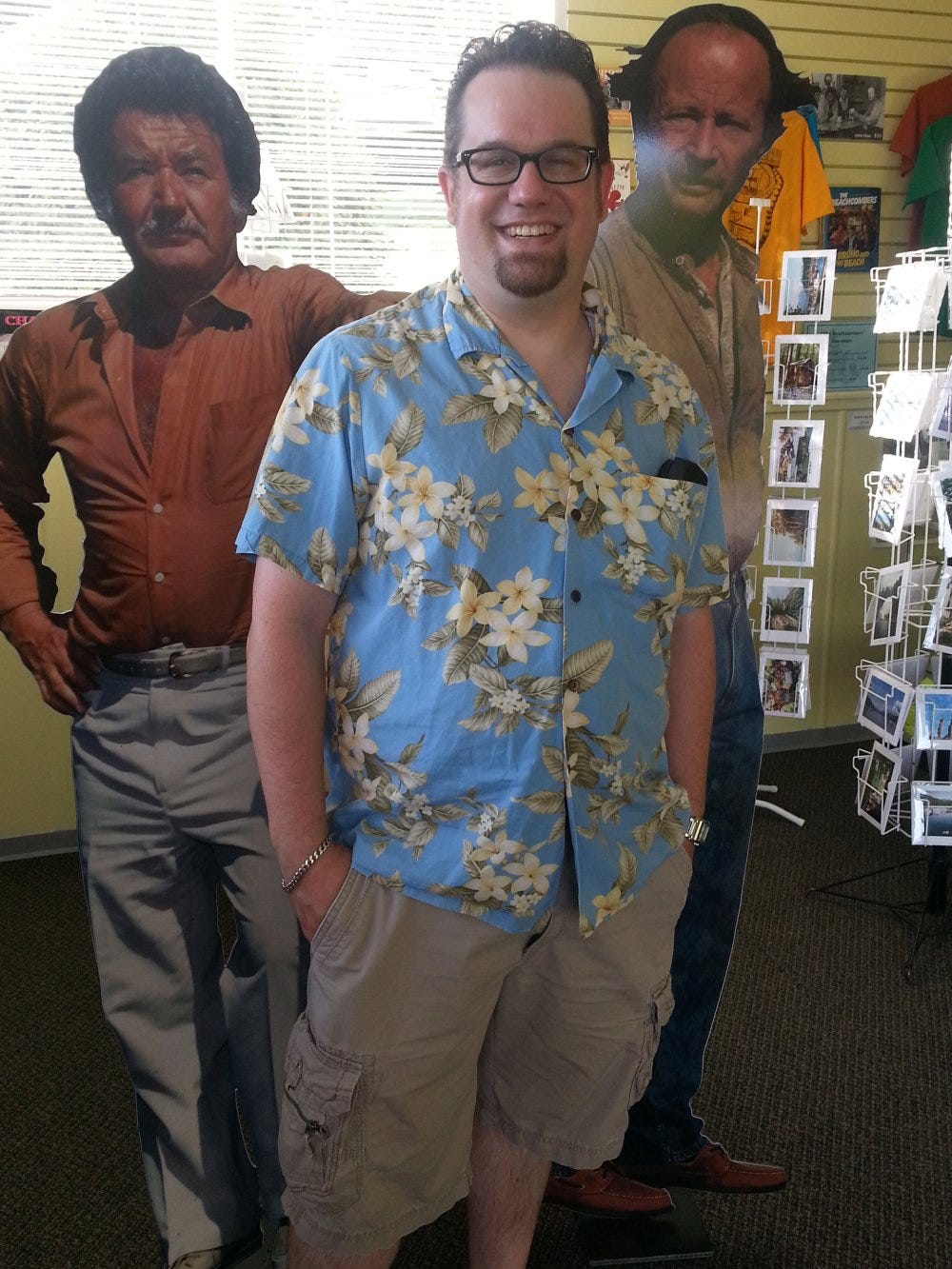9 things nobody tells you about the Sunshine Coast, BC
What we didn't know we needed to know
This post was written using a transcript from the above video. It’s been edited for clarity.
1. The Sunshine Coast isn’t an island
PAUL: The first thing we learned when we got to the Sunshine Coast, BC was that we're not an island. We knew that ahead of time...
VAL: Yeah, we knew that. [laughter]
PAUL: We knew. We did. When you look at the map, you see the Sunshine Coast on the mainland, and it's very clear that it’s on the mainland. But visiting from another province, you think of the Sunshine Coast as being Vancouver Island-ish.
VAL: When you visit, you need to ride a ferry from Horseshoe Bay to Langdale, so as soon as you're getting on a ferry, you're thinking, “I'm going to an island." And even some Vancouverites grew up believing that getting on a ferry means you’re going to an island. You ride the ferry to the Sunshine Coast but it’s not an island.
PAUL: Definitely NOT an island. And the first time you mistakenly refer to it as such, you will immediately...
VAL: Regret it? [laughter]
PAUL: ...and aggressively be corrected that, “The Sunshine Coast is NOT an island.”
2. Some parts of the Sunshine Coast don't have a fire department
PAUL: There are three main areas on the Sunshine Coast that aren't covered by the fire department. The three big ones are Gambier Island, Keats Island, and the stretch of road that runs from YMCA Road all the way to the Port Mellon Mill.
VAL: YMCA Road is in Langdale. So basically from just north of Langdale to Port Mellon, there's a section there not covered by a fire department. All the fire departments are volunteer fire departments on the Sunshine Coast, and with volunteer fire departments, you can only cover so much area. There has to be a limit to how large of an area a fire department can service and look after.
PAUL: And unfortunately, that area between Port Mellon and Langdale doesn’t make the cut. What that means is that if you own a property in that no-coverage zone and there’s a fire at your property and you phone the fire department, the fire department doesn't come.
VAL: They will but only if there's a life at risk. They’ll make an exception and come, but if it's just structural fire, they won't come. And if the fire is going to go into the trees and into the forest and grow bigger, then that's the Wildlife Fire Protection Service that gets involved.
PAUL: What this means is that if you're planning to move to the Sunshine Coast, either as a tenant or a homeowner, you need to ask your would-be landlord or your Realtor, "What is the deal with fire coverage and fire department call outs in this area?"
VAL: You can get fire insurance coverage, but you'll just likely pay a premium.
3. Town names on the Sunshine Coast, BC can be confusing
VAL: Something else about the Sunshine Coast and its different areas is the naming of the communities. There's obviously places like Gibsons and Sechelt and Pender Harbour, but there are also smaller communities neighbouring those places and that's where the confusion comes in. Take, for example, Granthams Landing. If you mail a letter to Granthams Landing, the mailing address will say Gibsons.
PAUL: Langdale is the same thing. Langdale is its own little community with its own school, but if you mail a letter to Langdale, the address you write on the envelope will say Gibsons.
VAL: When you're looking on Realtor.ca, you might see a property that’s listed as being in Gibsons. That could mean it’s in Gibsons-proper, a town of about 5,000 people. But it may also be in one of the surrounding areas, places like Granthams Landing or Langdale. You'll have to look at a map and look at the specific spot where you're buying to make sure it’s where you think it is.
PAUL: Yeah, you'd be forgiven for thinking, “Oh, Gibsons is Gibsons,” but there can be a huge difference.
VAL: Sechelt is the other good example. It encompasses a lot of surrounding areas. Wilson Creek is considered Sechelt, as are Tuwanek, Sandy Hook, and Davis Bay. They all have a Sechelt mailing address.
4. BC's Land Transfer Tax
VAL: In BC, there's a land transfer tax. In Alberta, we didn't have to deal with that there so it was new to us. In BC, when you purchase a property, on closing, you’ll have to pay a one-time tax. There are a few exceptions, like if you've never owned an owner-occupied property anywhere in the world along while you've simultaneously been a BC resident for certain period of time. If you meet that pretty specific criteria, then you don't have to pay the tax on your first home, but for everyone else, it means you’re probably going to pay BC’s land transfer tax. As an example, the tax on a $900,000 house in Gibsons would be $16,000. There's a calculator online if you want to look up what your land transfer tax would be for the amount that you're planning on paying.
5. Natural gas isn't as common as in Alberta
PAUL: The other thing that surprised us when we arrived on the Sunshine Coast was that natural gas isn't as prevalent as it was in Alberta. Maybe that's just our sheltered upbringing in Alberta and maybe other parts of Canada don’t rely on natural gas the way Alberta does. But in Edmonton, it gets stinking cold in the winter time, so you need a gas furnace to keep yourself warm. That's not really as big a deal here on the Sunshine Coast. Lots of homes have electric heat or an alternative way of keeping warm.
VAL: A lot of people have wood furnaces, wood fireplaces.
PAUL: You can have natural gas brought to a property, but depending on the specific location, it can cost anywhere from thousands to tens-of-thousands of dollars. That's maybe something else to ask about when you're getting ready to rent or buy a specific property. Your monthly utility bill could be substantially more than what you’re used to if you're heating it with electric heat.
VAL: Especially for bigger homes. The heat is different, too. With a forced air furnace, the air will circulate inside your home, but when you just have radiant heat or electric heat, the air doesn’t move around as much.
PAUL: Electric heat is easy to live with, and it's not a big deal, but it's just something to have on your radar.
6. Road eggs
PAUL: The next item on the list is something we have called road eggs.
VAL: Road eggs are eggs you can buy on the side of the road. Often they are found in a cooler with a little jar and you buy them with the Honour System. You deposit your $5, $6, $7 in the jar and you grab yourself a carton of eggs from the side of the road. It's great!
PAUL: They're farm fresh.
VAL: There are a few places that you'll get to know along the Sunshine Coast that have road eggs. You’ll be driving when you see something on the side of the road, usually right at the entrance to a property. You’ll see that there's a cooler sitting there and that’s when you say to yourself, "Ooh, maybe there's road eggs!" Maybe you’ll be there too late and they're all gone but maybe you’ll get lucky and there’ll still be some for you.
7. Window screens aren't always a thing
PAUL: When we first visited the Sunshine Coast for a week to see if we liked the area or not, we had this cute little cottage not far from the water in Hopkins Landing. We really enjoyed staying there but at night it would get SO hot. When we tried to open the windows, we saw that there were no screens on the windows. At first we thought, “Oh, the cottage must have been renovated,” or, “Maybe somebody stole the window screens,” or, “The window screens must have been wrecked.” In our minds, there had to be a reason that there were no screens in the windows. That lack of screens meant we we didn't open any windows and slept in a very hot little cottage for the week that we were here.
VAL: We kept the windows closed because we thought that if we opened up the windows, mosquitoes and flies and other pests would fly in.
PAUL: It wasn't until we moved here and we were talking to locals that that we discovered that window screens in every window aren’t always a thing.
VAL: There aren’t very many mosquitoes here. Around the water, there may be some, but in general, we don’t live with a mosquito problem.
PAUL: If you’re around standing water, you’ll see mosquitoes. Or if you're on a hike up the mountain, you'll come across mosquitoes. But very rarely do we get attacked by mosquitoes in our day-to-day lives.
VAL: That’s why you don't really need screens. You can keep your doors opened and your windows opened without being infested. While we don’t see a lot of mosquitoes, you might see more spiders here...
PAUL: And bigger spiders...
VAL: All that said, our windows have screens and we use them all the time.
8. The Sunshine Coast keeps it casual
VAL: When I moved here, I eventually realized that I don't really wear high heels and makeup so much. I don't why that is, but it's just more chilled here. If you're moving out here, leave the makeup behind. And high heels are just not practical. You're either walking to the beach or walking to work, or maybe you have a trades job. Either way, you just won't wear high heels as much.
PAUL: It’s pretty casual on the Sunshine Coast.
VAL: I even see fewer men wearing ties and suits. My first thought when I see someone all suited up, "Oh, you must be from the city."
PAUL: Or you're going to court.
VAL: Yeah, or going to court, I guess.
PAUL: “What did that guy do? Why’s he wearing a suit?”
VAL: I's funny because I'll go paddling with my paddling buddies, and we go out for coffee in our paddling outfits. If we’re sitting there and some walks in all done up, we turn to each other and we say to ourselves, “Ooh, a visitor from the city.”
9. DEER! DEER EVERYWHERE!
PAUL: Number nine on the list of things nobody tells you about the Sunshine Coast is that you're going to have all kinds of interesting neighbors when you move here, specifically deer.
VAL: The deer are very pretty, and very fun to look at. Often they'll find a favorite spot in the shade near your garden or in your backyard and just hang out. And while they’re sitting in the shade, you’ll get to watch them and look at them. While they're very pretty, you’ll soon learn that you need to have a fence around your garden because deer really like to eat out of your garden.
PAUL: They like to eat everything. If you fence off your garden, they'll eat your trees. Fence off your trees, and they’ll find something else to get into. It's lovely to see them and it's still kind of crazy to see animals wandering through the yard, even after living here for seven or eight years. But the deer get into things so you’ll if you don't want them eating out of house and home, you’ll need to close off your garden, or put a fence around your yard.
VAL: You'll see some cedar trees of have an interesting pattern trimmed into them; they're trimmed up to a certain point. That pattern comes from the deer eating the cedar tree. That's why a lot of the cedars on the Sunshine Coast have that weird trimming.
PAUL: It’s because the deer can only reach up so high up into the tree, and it makes a funny shape in the tree.
VAL: And of course, be careful driving so you don’t hit a deer. In the spring and summer when the deer have their little fawns, it’s even more important to watch for them along the side of the road. Drive around and you'll see road signs - like homemade little road signs - that people will put along the road, warning you that there's a fawn or there's a young deer family in the area and that you should slow down.
PAUL: We could probably do a whole video about deer.
VAL: Oh deer…
Now you’re smarter than we were
PAUL: With those nine things, you're now smarter than we were when we moved away from Alberta and into BC. If you're living on the Sunshine Coast, leave us a comment and let us know about something that it took you a little while to figure out.
VAL: Or even if you've moved from one place to another place, maybe there's something interesting that you learned about your new home that you feel like sharing in the comments with the rest of us.
This post was written using a transcript from the above video. It’s been edited for clarity.


